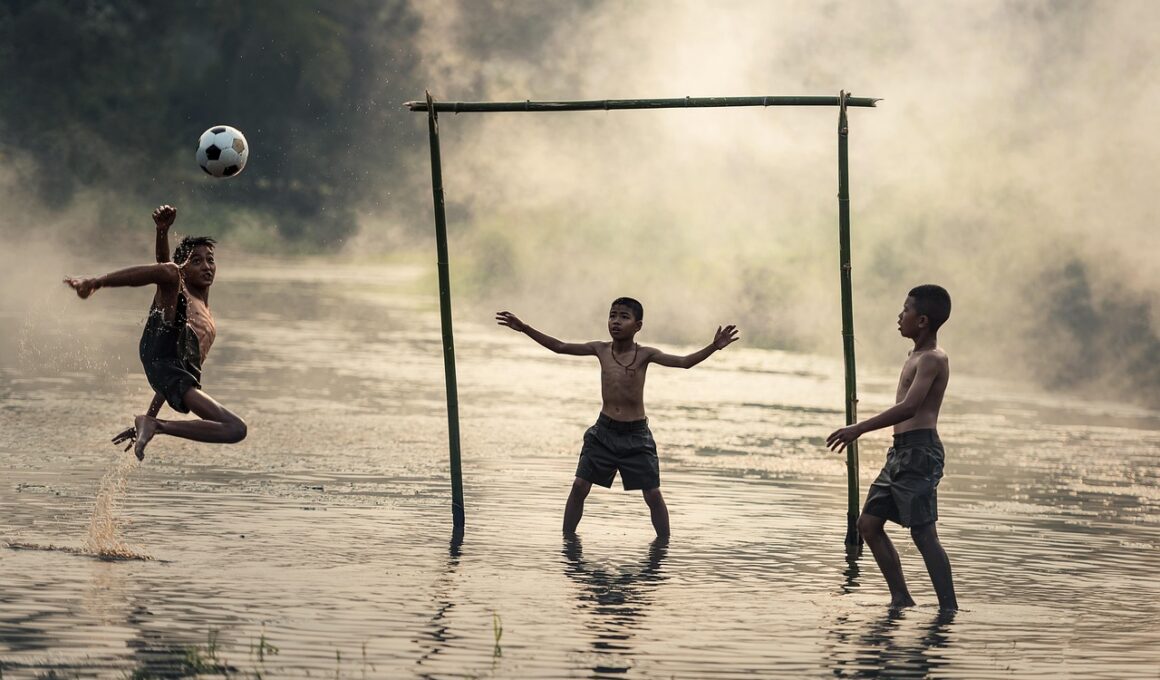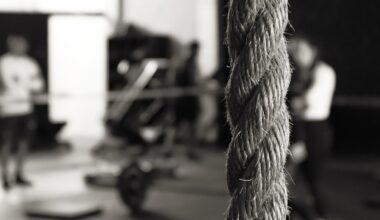The Importance of Teamwork in Sepak Takraw
Teamwork is essential in the sport of Sepak Takraw, a game that combines elements of soccer and volleyball. Athletes must work collaboratively to excel, using specific skills that complement each other. The game’s objective is to hit a rattan ball over a net, where players take turns to score points against their opponents. Each team is made up of three players, and communication on the court is paramount for success. Practicing together helps build a stronger bond, enhancing synergy and trust among teammates. Individual skills, such as kicking, heading, or strategic placement, are improved through team sessions. Moreover, players learn to anticipate their teammates’ moves, which allows for fluid gameplay. Effective teamwork also instills discipline and commitment, as every player understands their role and responsibilities during matches. With the right teamwork, teams can outmaneuver and outscore their rivals, making cooperation not just beneficial but crucial. Trained athletes develop a sense of camaraderie, encouraging each other during tough games. This collective spirit fosters resilience, motivating the team to perform at its best in competitive scenarios. Thus, teamwork is the backbone of Sepak Takraw.
Beyond the physical aspects, teamwork enhances mental strength. When players communicate openly, they build trust, reducing miscommunication during crucial points in the match. Effective collaboration allows teams to devise strategic plays, maximizing each player’s strengths. During training sessions, this also cultivates a positive atmosphere where all players can contribute ideas, leading to innovative tactics. The players become adept at problem-solving on the court, adjusting their strategies based on opponents’ strengths and weaknesses. This adaptability is often what makes or breaks a team during competitions. As players develop their game sense through teamwork, they improve their ability to read the game flow. Teamwork elevates the level of competition, as players learn not just from victories but also from defeats. They share feedback after games, discussing what worked and what didn’t, refining their approach for the future. This reflective process is crucial for growth and development, both individually and as a team. In Sepak Takraw, no player is an island; every success is a shared victory. Consequently, the bond players form leads to enhanced performance consistently, making teamwork a fundamental pillar of success.
In Sepak Takraw, roles are essential, and understanding these roles enhances teamwork and strategy. Each team member typically has a specific position: the server, the spiker, and the setter. The server initiates the play and needs strong technical skills to deliver effective serves. Meanwhile, the spiker’s job involves scoring points, often relying on powerful strikes and precise ball placement. The setter acts as a playmaker, orchestrating the team’s movements by delivering perfect passes. By understanding each other’s positions, players can anticipate where to be and how to support one another. Practices usually focus on refining these roles, enabling teammates to work seamlessly together during matches. By focusing on their individual responsibilities, players boost overall team performance. This specialization also builds confidence as players become proficient in their respective roles. The mix of different playing styles and personalities adds depth to the game, enhancing the experience for players and spectators alike. When each member excels in their area, the team becomes more cohesive and formidable. The emphasis on roles exemplifies how teamwork can lead to remarkable achievements in Sepak Takraw.
Camaraderie and Morale Boosts
Teamwork in Sepak Takraw fosters camaraderie, which is vital to maintaining high morale during competitions. When players support one another emotionally, it creates a strong sense of belonging within the team. High morale has significant advantages while competing against tougher opponents, as players uplift each other through motivation and encouragement. This support system reduces anxiety and stress during competitions, helping players remain focused and perform at their peak. Celebrating small victories together, such as executing a well-timed play, builds confidence and reinforces the importance of teamwork. Furthermore, learning to handle defeat gracefully as a united front develops character within the players. When facing losses, a cohesive team can share the responsibility and analyze what went wrong collectively. This constructive feedback loop ultimately leads to performance improvement. Social activities outside of training, such as team outings or bonding events, also fortify these relationships. Each shared experience strengthens the emotional ties between teammates, encouraging continued investment in each other’s success. Thus, the camaraderie built through teamwork ultimately shapes the team’s identity and their journey within Sepak Takraw.
Teamwork also plays a significant role in achieving long-term goals for Sepak Takraw athletes. Collaborative efforts ensure that players aspire towards common ambitions, such as winning tournaments or enhancing their skills. This joint focus drives them to work harder during practice sessions, implementing strategies and refining skills learned during competitions. With everyone pulling in the same direction, individual setbacks become shared challenges, leading to resilient problem-solving within the group. When a team shares aspirations, they hold themselves accountable, motivating each member to contribute. This unity transforms the practice environment into one of operations where players push each other to exceed their limits continually. Long-term engagement and commitment to a shared vision also deepen connections, fostering lifelong friendships among team members. It’s through these shared goals that players grow not just as athletes but also as individuals, developing valuable life skills. Perseverance, accountability, and dedication become woven into their character through shared experiences. Therefore, teamwork propels athletes on the field of Sepak Takraw and significantly impacts their personal development journeys.
The Competitive Edge of Teamwork
A team united in their efforts often holds a competitive edge, especially in fast-paced sports like Sepak Takraw. Strong teamwork enhances players’ ability to execute complex combinations during games, creating opportunities to catch their opponents off-guard. When every player is synchronized in their movements and decision-making, it creates a fluid style of play that is tough to counter. Experienced teams excel at quickly adjusting their strategies based on the current game situation and the opponents’ tactics. This agility stems from hours of practice, whereby team members have established a high level of trust in one another. Additionally, esteemed teamwork fosters an understanding of shared goals, which translates into concerted efforts towards achieving victory. The ability to anticipate each other’s moves allows for innovative plays to unfold on the court, dazzling fans and opponents alike. As teams develop their unique style, they cultivate an identity that can intimidate other squads. All these factors contribute to a significant competitive edge that can elevate a team’s status within Sepak Takraw leagues. Overall, enhancing teamwork directly correlates to improved performance and success.
In conclusion, the significance of teamwork in Sepak Takraw cannot be overstated. It involves collaboration, communication, and camaraderie, all of which lead to excellence on the court. Through well-coordinated strategies, players can maximize their strengths and compensate for weaknesses. The shared victories, morale boosts, and strong emotional ties contribute to a well-rounded experience that transcends the sport. Athletes hone their skills while developing lasting friendships and life lessons. Teamwork fosters resilience during defeats, enabling players to learn and grow from challenges faced along their journey. In competitive scenarios, this cohesion translates into remarkable gameplay, stunning teamwork, and impressive camaraderie. Ultimately, in the ever-evolving sport of Sepak Takraw, a strong focus on introducing teamwork will guarantee that players not only succeed in their immediate goals, but also cement a passion for the sport that lasts a lifetime. Hence, coaching techniques and training regimens should continue placing a premium on teamwork. By investing in collaboration, players unlock their boundless potential, allowing them to achieve unprecedented levels of success together.


